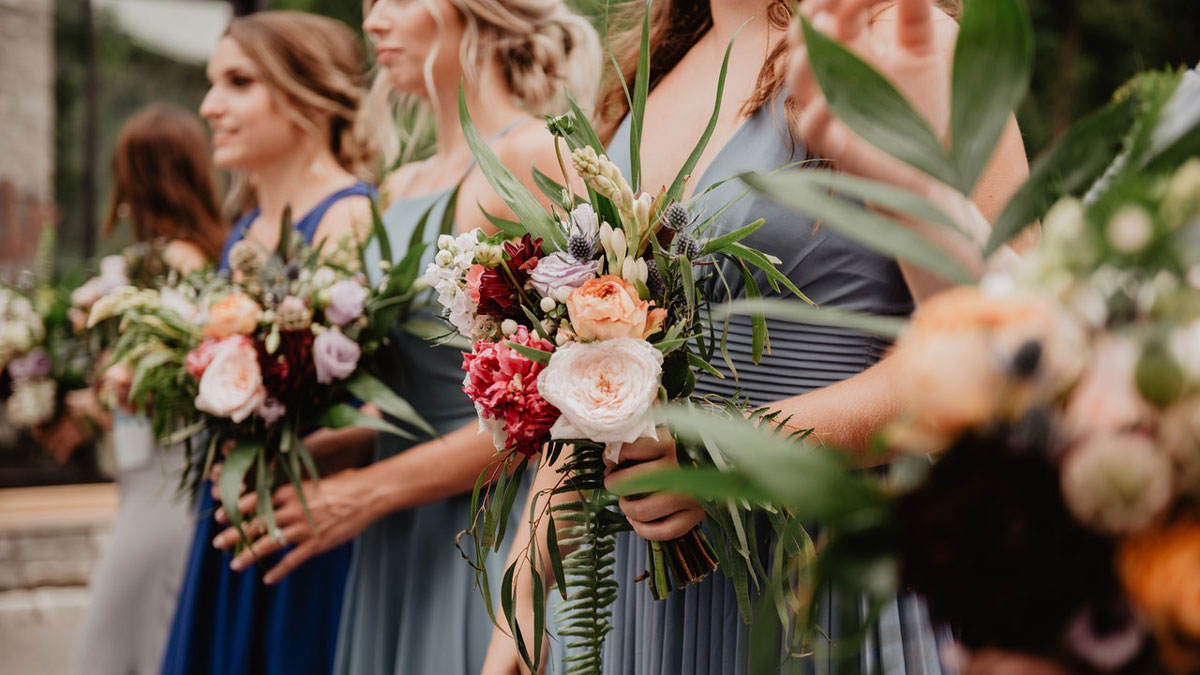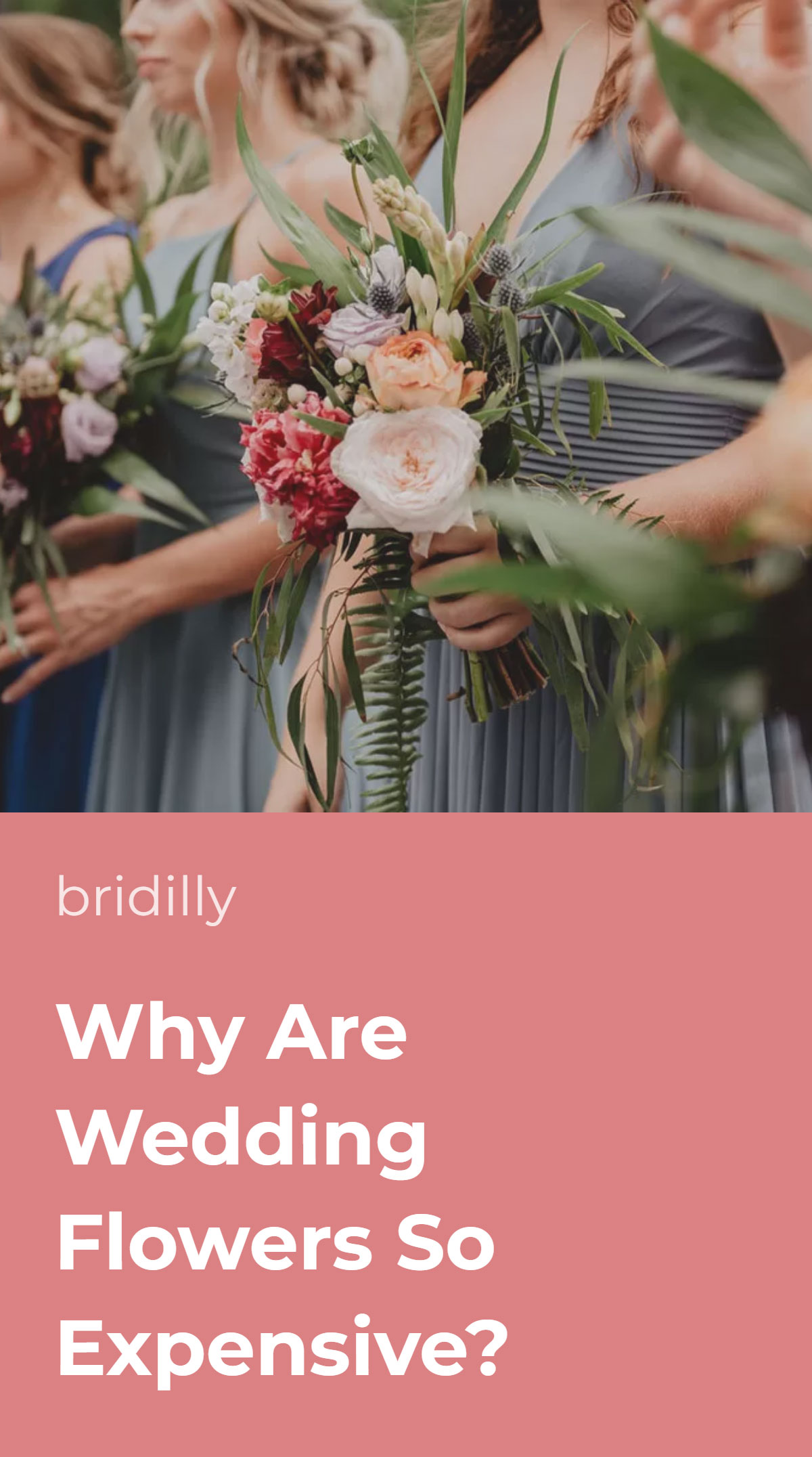You will never see regular flower arrangements as costly after discovering how expensive wedding flowers can be.
The average cost of a wedding bouquet exceeds $170. This isn’t much compared to the price of venue or dress but still immense for something so small and temporary.
You may think that a DIY wedding bouquet will be indistinguishable from a professional one. However, florists charge their rates for a reason.
They spend years learning and gaining experience to create extraordinary flower compositions that will accommodate all your wishes.
A common misconception is that the bouquet’s size affects its price. This may be true for some arrangements. But a small bouquet can be much costlier than a large one if it’s made from rare or unseasonal blooms.
As a wedding is a very special event, florists pay exceptional attention to details and design. Each floral chosen for a wedding flower arrangement must be flawless, and every design element must match the event style.
But when you’re ordering wedding flowers, you aren’t paying only to the florist. You also cover the labor of flower loaders and delivery drivers. Customer service and communication cost money, too.
Table of Contents [show]
Customer Service
Like with everything wedding-related, when ordering a bridal bouquet, you’re paying for more than just the product.
The florist’s job involves customer service. Therefore, a significant part of their job is design discussions, communication, and providing a pleasant experience to the client.
Some brides think that if you can’t touch something, it shouldn’t cost anything. But any labor must be paid for, even if it’s emotional.
So you’re paying for the time spent on you and the florist’s effort to accommodate your needs and wants.
Even if you don’t communicate in person, you likely do that by e-mail or over the phone. The florist can’t serve other clients or create bouquets during the talk or while writing an e-mail.
In other words, they’re losing time that could be used to earn money. And this time should be compensated, too.
Florists genuinely want to deliver you the best possible service and bring your bravest requests to life.
However, they understand that this isn’t an ordinary bouquet, and the discussion process is a part of your wedding experience.
Of course, you can’t save on your bouquet by asking the florist to behave as they wish and eliminating communication completely.
However, politeness and kindness don’t come at a separate fee; they’re included in the total price of high-quality service.
Design
Floral design is a form of art. You can’t just come to the store, point at random flowers, and get a bouquet.
Well, you can if the occasion isn’t something to bother about. But a wedding raises the design plank sky-high, and flower design is no exception.
Florists spend hours creating elegant wedding bouquet designs. But, even if you already have a bouquet idea in mind, numerous factors can halt the florist from bringing it to life.
For instance, you want a bouquet of lilies and jasmine. But these flowers bloom in different seasons and may not be available. In this case, the florist must come up with a worthy alternative to your favorite blooms.
Letting the florist make a bouquet following their taste is a risky idea, too. Even if the bouquet turns out breathtakingly beautiful, you may not feel it belongs to you.
And this certainly isn’t a way to save money. Creating design from scratch requires even more time and effort than making it by the customer’s requests.
Lastly, some brides have unusual wedding bouquet ideas which may be hard to bring to life. For example, let’s assume you want a bouquet from a mix of fresh flowers and jewels.
But a florist may have no experience working with stones. If the florist must spend time on a challenging task, they will likely charge more.
Attention to Detail
A wedding isn’t a “hit or miss” type of event. Instead, it demands immense attention to detail to ensure everything goes smoothly and looks as you want. You don’t want to regret your bouquet didn’t turn out as expected for decades to come.
Flowers aren’t stamped at factories. They are nature’s creation, and every bloom is different. Florists spend hours choosing the most beautiful exemplars for wedding bouquets.
Florists pay attention to the stems, leaves, and petals, match the blooms by size and color. There’s no room for mistake, and the florist strives to create a bouquet that will look impeccable in pictures.
Flowers for a wedding bouquet must also be the freshest. Not only should they last the entire day without looking dull, but they should also stay in a vase for at least some days afterward.
If you’re ordering flower arrangements for wedding guests or the tables as well, the florist’s job becomes even more challenging. First, imagine searching for five flawless blooms. Now, imagine you must find 50 of them.
Attention to detail can be seen not only in the flower quality. It’s also required in the design process. Most brides don’t provide specific instructions on their dream bouquet.
Instead, they tend to mention their favorite flowers and color. The florist can be happy if they mention the wedding style, too.
The florist’s job is to match every minor element to meet the bride’s preferences. For example, every leaf and bead should correspond to the overall event style, the ribbon length must be optimal, and the stems cut evenly.
Labor
Now, to the obvious point. Or is it? It’s no surprise that the florist’s work takes time, but not everyone understands how complicated it is.
Florist’s job isn’t only assembling stems, customer service, and design, which I’ve already mentioned. It also involves flower ordering, quality checks, care, and delivery.
Typically, these actions require more than one person. You only communicate with the florist, but you don’t see the delivery drivers and loaders.
Flowers arrive at florists in bulk. They should then unpack every box, unwrap every individual flower, and inspect it for freshness and damages.
Each stem must then be cut and placed in a bucket with special treatment. Then, and only afterward, can they be used for your wedding bouquet.
Rare Flowers
Exotic flowers in wedding bouquets rapidly gain popularity. But rare blooms come with a hefty price tag. They often require special conditions to grow that aren’t easy to achieve in our climate or must be delivered from far away.
Plus, unique flowers aren’t as popular as traditional roses or lilies – lower supply results in higher prices.
Peonies and roses are beloved by many women. If your favorite flowers are common, you’re lucky to have a chance to save some money.
However, standing out with a white rose bouquet isn’t that simple (though possible), and some brides are looking for more extravagant options.
Olive branches, pampas grass, anthurium leaves, or succulents cost more per piece than common blooms. And while the difference per single flower may be insignificant, the price difference for the whole bouquet is noticeable.
You don’t have to opt for the most expensive flowers to stand out, though. Instead, you can choose dried or meadow florals or go for an unusual color combination.
Season
Weather and season are the two factors that affect flower cost and quality the most. They directly affect the flower supply, leading to price fluctuations.
A simple way to skyrocket your wedding bouquet price is to choose summer flowers in the middle of winter.
Some blooms may not be available at certain months at all. But, of course, not being able to get a bouquet with your favorite florals is upsetting.
In this case, you should work together with the florist to find an alternative. But extra communication means extra fees.
Florals of the same kind but different colors may also bloom during different months. So, yellow narcissus is typically available at florists in winter, whereas white in spring.
Nowadays, transportation speed and technology allow flowers to travel around the entire globe.
So you likely can get any florals you want if you search at your local florists long enough. But transportation to another part of the world comes at a premium fee.
Optional Add-Ons
Weddings often involve a colossal number of florals. Wedding flower arrangements rarely end with the bride’s bouquet.
Every additional request comes at an extra charge. Add-ons also include special requests such as inserting non-floral items into arrangements.
Many couples decorate the aisle, altar, and entryway with flowers during the ceremony.
Then, they order more arrangements for the cocktail hour table, food station, wedding cake, groomsmen boutonnieres, and bridesmaid bouquets. The list can go on. Some brides even order a second bouquet only to toss it.
Delivery
Wedding venues aren’t always located close to the florist. Therefore, flowers must be delivered to your venue safely and quickly to remain fresh. The delivery fee consists not only of the basic fuel costs but also of the driver’s wage.
If you’ve only ordered a bride’s bouquet and groom’s boutonniere, you can save on delivery by taking the flowers yourself.
That isn’t a fact, though, as the florist may not be located on your way. But if you’ve ordered many flower arrangements, delivery fees are inevitable.
Flowers are fragile and must be handled with care. Professional delivery ensures they arrive undamaged and on time.


















No Comments Add one
Leave a Comment